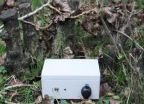(Press-News.org) New technologies are changing the way we collect biodiversity data. Data that once required taking expensive, bulky and fragile equipment on field trips can now be collected on cheap, compact and robust devices. In a recent paper in the Biodiversity Data Journal the construction of an environmental data-logger using the Arduino platform is described. It is hoped that this work will encourage the adoption of new data collection technologies by biodiversity scientists and foster new collaborations with both electronics hobbyists and electronics engineers who have an interest in biodiversity.
The Arduino platform (a microcontroller device designed to make interactive prototypes at low cost) provides a low-cost and customizable alternative to expensive proprietary data loggers and sensors. We increasingly rely on citizen scientists to collect the data at the core of our science, in particular the network of biological recorders who provide much of our knowledge on the changing distribution of species. Many of these people are interested in using technology to maximize the value of the data they collect, but don't have the financial or technological resources to make full use of the opportunities technology provides. Projects such as the one described here will enable wider access to the latest technologies.
In recent years biodiversity science has made use of increasingly large datasets, from the global collection of specimen and observation data in the Global Biodiversity Information Facility (GBIF) to monitoring changes in habitat and vegetation using data from satellites. Technologies such as those described here will add value to traditional biodiversity studies, and increase their use in aiding us to understand species and how their interact with their environment.
"The introduction of easy-to-use micro-controller devices such as the Arduino brought working with digital electronics to a broader audience," comments the author Ed Baker. "There is great potential for the biodiversity community if we collaborate with knowledgeable 'hackers' and 'makers' as citizen engineers in the same way we interact with knowledgeable amateur natural historians as citizen scientists."
INFORMATION:
Original Source:
Baker E (2014) Open source data logger for low-cost environmental monitoring. Biodiversity Data Journal 2: e1059. DOI: 10.3897/BDJ.2.e1059
Hacking the environment: bringing biodiversity hardware into the open
2014-02-11
ELSE PRESS RELEASES FROM THIS DATE:
Exon skipping prevents formation of toxic protein fragments in Huntington's disease
2014-02-11
New Rochelle, NY, February 11, 2014—An innovative therapeutic strategy for reducing the levels of toxic protein fragments associated with Huntington's disease uses a new approach called exon skipping to remove the disease-causing component of the essential protein, huntingtin. Proof of concept using antisense oligonucleotides to "skip over" the specific exon in a mouse model of Huntington's disease is reported in an article in Nucleic Acid Therapeutics, a peer-reviewed journal from Mary Ann Liebert, Inc., publishers. The article, part of a special focus issue on exon skipping, ...
Excess weight linked to brain changes that may relate to memory, emotions, and appetite
2014-02-11
Being overweight appears related to reduced levels of a molecule that reflects brain cell health in the hippocampus, a part of the brain involved in memory, learning, and emotions, and likely also involved in appetite control, according to a study performed by researchers at SUNY Downstate Medical Center and other institutions. The results of the study were published in Neuroimage: Clinical.
Jeremy D. Coplan, MD, professor of psychiatry at SUNY Downstate, led a multicenter team that visualized the molecule, N-acetyl-aspartate (NAA), using magnetic resonance spectroscopy, ...
RI Hospital: Cognitive behavioral therapy benefits patients with body dysmorphic disorder
2014-02-11
PROVIDENCE, R.I. – In a recent study, researchers at Rhode Island Hospital found significant benefits of cognitive behavioral therapy as a treatment modality for patients with Body Dysmorphic Disorder (BDD). BDD is a common, often severe, and under-recognized body image disorder that affects an estimated 1.7 percent to 2.4 percent of the population. This study demonstrated significant improvement in patients' BDD symptoms and level of disability, as well as high levels of patient satisfaction with the treatment. The study is published online in advance of print in the journal ...
Source of 'moon curse' revealed by eclipse
2014-02-11
Strange events have long been linked to nights of a full moon, though careful scrutiny dispels any association. So, when signals bounced off the lunar surface returned surprisingly faint echoes on full moon nights, scientists sought an explanation in reason rather than superstition. Still, the most compelling evidence arrived during another event that once evoked irrational fears—on a night when Earth's shadow eclipsed the full moon.
Tom Murphy, a physicist at UC San Diego, is among the scientists who have aimed laser beams at suitcase-sized reflectors placed on the moon ...
Study: Resilience in parents of children undergoing stem cell transplant
2014-02-11
A child's illness can challenge a parent's wellbeing. However, a study recently published in the journal Biology of Blood and Marrow Transplantation shows that in the case of a child's stem cell transplant, parents feel increased distress at the time of the procedure, but eventually recover to normal levels of adjustment.
"Across all study groups, what we basically showed is that parents are resilient. Overall, parents get better over time," says Jennifer Lindwall, PhD, assistant professor of psychiatry at the CU School of Medicine, teaching partner of the University ...
Data on today's youth reveal childhood clues for later risk of STDs
2014-02-11
Here's yet another reason to focus on kids' early years. Children who grow up in well-managed households, enjoy school, and have friends who stay out of trouble report fewer sexually transmitted diseases in young adulthood, according to a new analysis.
The findings, from University of Washington longitudinal surveys of nearly 2,000 participants, suggest that efforts to curb the spread of sexually transmitted diseases should begin years before most people start having sex.
"Pay less attention to the sex aspect of this and think of the larger context," is lead author ...
Targeting tumors: Ion beam accelerators take aim at cancer
2014-02-11
EVENT: Advances in the design and operation of particle accelerators built for basic physics research are leading to the rapid evolution of machines that deliver cancer-killing beams. Hear about the latest developments and challenges in this field from a physicist, a radiobiologist, and a clinical oncologist, and participate in a discussion about cost, access, and ethics at a symposium organized by the U.S. Department of Energy's Brookhaven National Laboratory ("Targeting Tumors: Ion Beam Accelerators Take Aim at Cancer") and at a related press briefing--both to be held ...
Nanoparticles treat muscular dystrophy in mice
2014-02-11
Researchers at Washington University School of Medicine in St. Louis have demonstrated a new approach to treating muscular dystrophy. Mice with a form of this muscle-weakening disease showed improved strength and heart function when treated with nanoparticles loaded with rapamycin, an immunosuppressive drug recently found to improve recycling of cellular waste.
The study appears online in The FASEB Journal.
The investigators, including first author Kristin P. Bibee, MD, PhD, looked at a mouse model of Duchenne muscular dystrophy, the most severe inherited form of the ...
Child abuse rises with income inequality, study shows
2014-02-11
ITHACA, N.Y. – As the Great Recession deepened and income inequality became more pronounced, county-by-county rates of child maltreatment – from sexual, physical and emotional abuse to traumatic brain injuries and death – worsened, according to a nationwide study by Cornell University.
The income inequality-child maltreatment study, to be published in the March 2014 edition of the peer-review journal Pediatrics, covers all 3,142 American counties from 2005-09, and is one of the most comprehensive of its kind and the first to target child abuse in places with the greatest ...
I smoke, but I'm not a smoker
2014-02-11
While smoking among California adults has dramatically declined in recent decades, researchers at the University of California, San Diego School of Medicine report there is a surprisingly large number of people who say they use cigarettes, but don't consider themselves to be "smokers."
Writing in the February 5 online issue of Tobacco Control, Wael K. Al-Delaimy, MD, PhD, professor and chief of the Division of Global Health in the UC San Diego Department of Family and Preventive Medicine, and colleagues estimate that, in 2011, almost 396,000 Californians (12.3 percent ...



